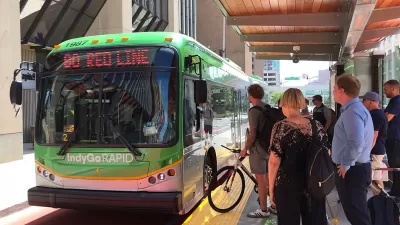Waiting for the funding to back up a transit plan can be brutal—especially when the calendar says February you thought you approved a transit-funding tax in the November election.

Voters and advocates in Indianapolis are learning that their vote to approve Question 2, a referendum to approve a transit-funding income tax, had a catch: it didn't actually approve a new law.
Despite earning 59.26 percent of the vote, writes Amber Stearns, "the ballot question in November was simply a way to gauge public support — to see if people would see a value in supporting mass transit in the form of a small income tax."
Now the task of passing the transit tax into law is up to the Indianapolis City Council, "and among the 25 city-county councilors there are a lot of mixed feelings about this proposal," reports Stearns.
At risk is a constant stream of revenue for IndyGo, and a transit plan that "includes a re-work of bus routes and frequency, a streamlined 7-day schedule for greater reliability and three rapid transit lines," writes Stearns. Planetizen Correspondent Irvin Dawid reported in detail on the unique structure of the income tax, and the political support that earned Question 2's approval, in an article from November.
The article by Stearns also offers an in-depth exploration of the politics at play as the tax heads to an expected vote in the City Council on February 27.
FULL STORY: City-County Council finds a difficult path to funding mass transit in Indy

Study: Maui’s Plan to Convert Vacation Rentals to Long-Term Housing Could Cause Nearly $1 Billion Economic Loss
The plan would reduce visitor accommodation by 25,% resulting in 1,900 jobs lost.

Placekeeping: Setting a New Precedent for City Planners
How a preservation-based approach to redevelopment and urban design can prevent displacement and honor legacy communities.

Using Old Oil and Gas Wells for Green Energy Storage
Penn State researchers have found that repurposing abandoned oil and gas wells for geothermal-assisted compressed-air energy storage can boost efficiency, reduce environmental risks, and support clean energy and job transitions.

Washington State Plans Ambitious ‘Cycle Highway’ Network
The state is directing funding to close gaps in its existing bike network and make long-distance trips more accessible.

Homeowners Blame PG&E for Delays in ADU Permits
The utility says it has dramatically reduced its backlog, but applicants say they still face months-long delays for approvals for new electrical work.

Rethinking Wildfire Defense: How a Landscape Approach Can Protect Neighborhoods
Post-fire analysis of the Eaton Fire reveals that a landscape approach — including fire-resistant vegetation, home hardening, and strategic planning — can help reduce wildfire risk, challenging assumptions that trees and plants are primary fire hazards.
Urban Design for Planners 1: Software Tools
This six-course series explores essential urban design concepts using open source software and equips planners with the tools they need to participate fully in the urban design process.
Planning for Universal Design
Learn the tools for implementing Universal Design in planning regulations.
Borough of Carlisle
Caltrans
Heyer Gruel & Associates PA
Institute for Housing and Urban Development Studies (IHS)
City of Grandview
Harvard GSD Executive Education
Salt Lake City
NYU Wagner Graduate School of Public Service
City of Cambridge, Maryland



























